13 Best WordPress Malware Scanner Plugins (Compared)
by
7-layers of Security for Your WordPress Site
Your website needs the most comprehensive security to protect it from the constant attacks it faces everyday.
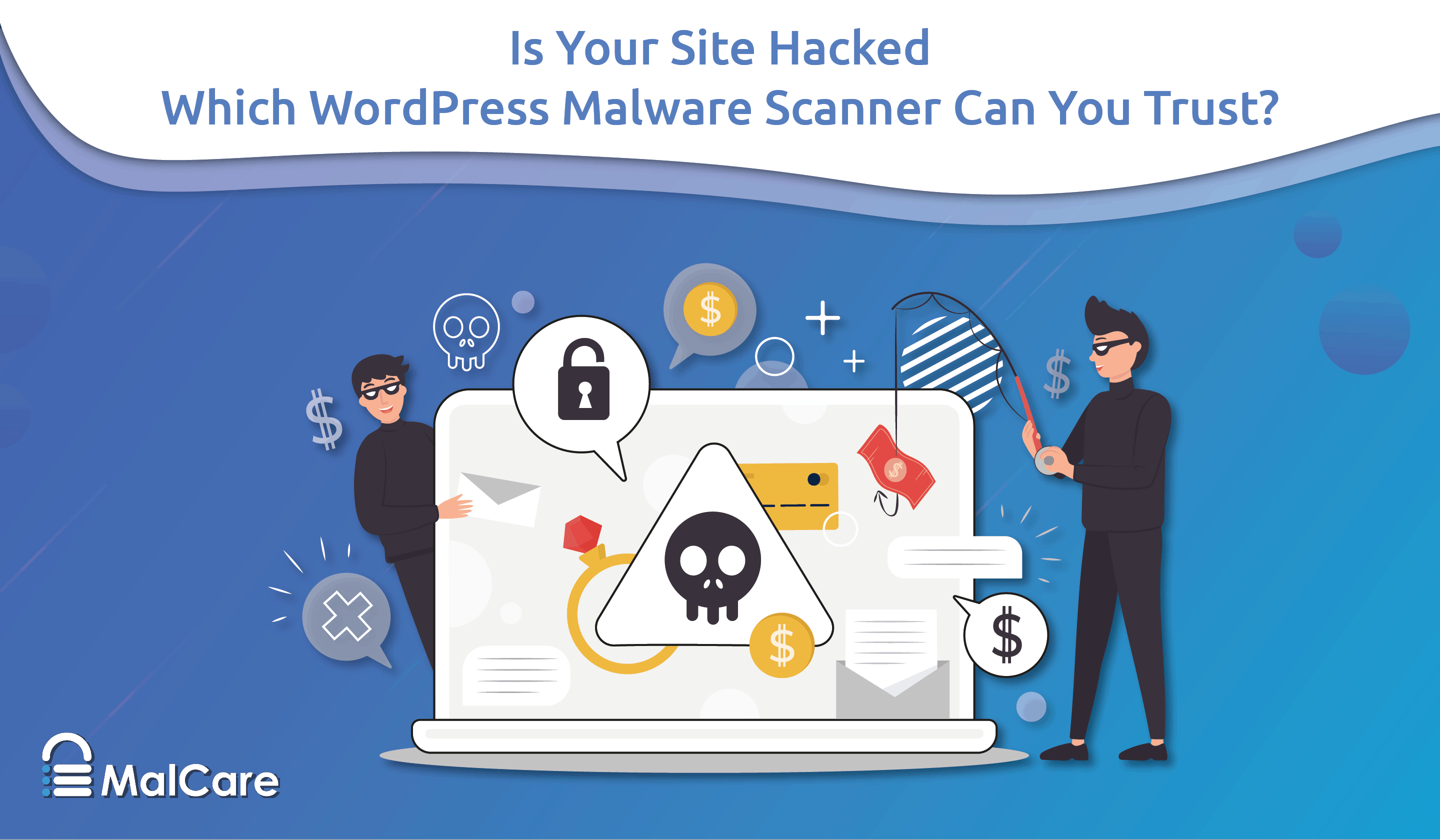
Protecting your WordPress site from non-stop malware threats can be tough. It’s even harder when your current scanner misses some malware on sites that are clearly hacked.
If you’re on shared hosting, you face even more risk because these servers are often an easy target. And if all that wasn’t enough, most web hosts don’t even offer their own malware scanners, leaving you to fend for yourself.
To help you navigate this, our seasoned team has thoroughly tested several plugins and created this handy list. It offers straightforward, unbiased reviews of the best WordPress malware scanners, all geared toward making your site safer.
TLDR: MalCare is the best free malware scanner for WordPress sites. You get a definitive, trustworthy report on whether or not your site is hacked. To remove malware, you need to upgrade to a subscription.
A good WordPress malware scanner is an essential part of your WordPress security toolkit. Having said that, it is difficult to pick the right one. There are many, many options, and not all scanners are the same.
So what is a malware scanner?
A malware scanner locates malware on a WordPress website. We have to reiterate this a surprising number of times.
Here is what a malware scanner isn’t:
- It is not a vulnerability scanner, although that is still a part of keeping a site secure.
- It is not a file change monitor.
- It is definitely not a blacklist scanner.
Additionally, a malware scanner must be able to detect malware anywhere on a WordPress site: files and the database. Malware doesn’t conveniently hang out in just the files; it infects database tables with equal ferocity. Hacked redirect malware is a prime example of a database-based infection.
We put a bunch of malware or virus scanners under a microscope to see which ones are able to ferret out malware. We tested 13 WordPress malware scanner plugins against:
- File-based malware in free and open source plugins and themes; arguably the easiest to find
- File-based malware in premium plugins that are trickier to find, because the code is not openly available for comparison
- Database malware which is usually ignored by scanners
- Custom malware that is a riff off existing malware, slightly changed to avoid detection by signature-matching scanners, which compares code to a database of malware signatures
Armed thus with a malware-ridden test site that would horrify any WordPress admin, we put the scanners through their paces. The results are below.
1. MalCare
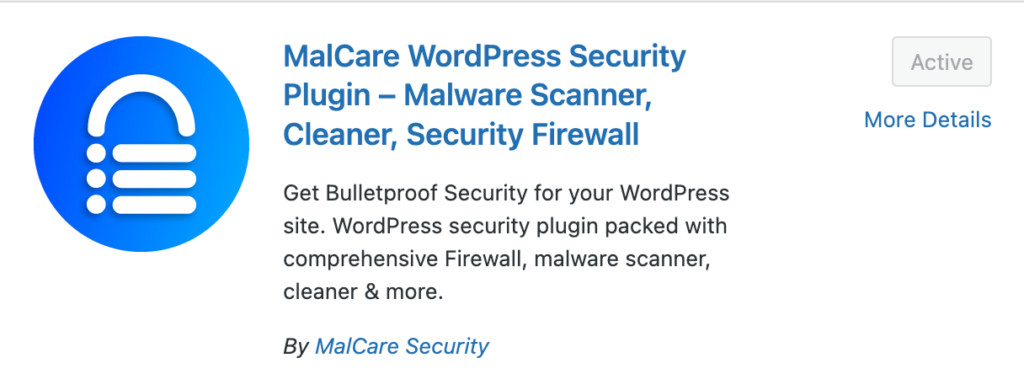
MalCare is the only WordPress malware scanner that found every instance of malware on our test site. Honestly, we could end the review here, because that’s the most important facet of a malware scanner, however there is more to say.
Let’s start from the beginning. Installing MalCare was a cinch: created an account, set up the site to sync, and within minutes we had a scan report. Our test was hacked, and we could upgrade the plan to clean it. The free plugin doesn’t show the location of the malware either. It is simply an answer to the question: is my site hacked?
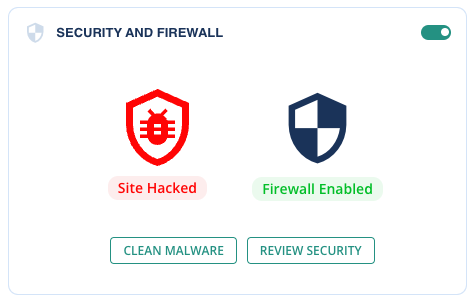
While this might be off putting for some, it is still a definitive answer. Additionally, the free plugin will automatically scan your site once a day. This is considerable peace of mind at literally zero cost. On-demand scans are a premium feature.
Crucially, MalCare flagged every single instance of malware on the site. We threw a lot of different types of malware at each scanner, and MalCare was the only one that caught them all. This is down to the unique signal-based scanning algorithm, rather than the more traditional signature-matching one. In simple terms, a signal-based scanner looks at the behaviour of code to figure out if it is malicious, rather than compare it word-for-word with a database of malware signatures. We talk about the distinction between the two in a later section, but suffice it to say, signals are much better than signatures.
One feature that really stood out amongst the (competent) competition is the lack of performance impact. The scanner works remotely, using MalCare’s servers to do the heavy lifting. Our test site’s server doesn’t even register a blip on the CPU and disk monitoring tools during scans.
Finally, MalCare correctly flagged all vulnerabilities in both themes and plugins. While this is definitely not the purpose of a scanner, it is a nice-to-have, as vulnerabilities are the leading cause of all hacks.
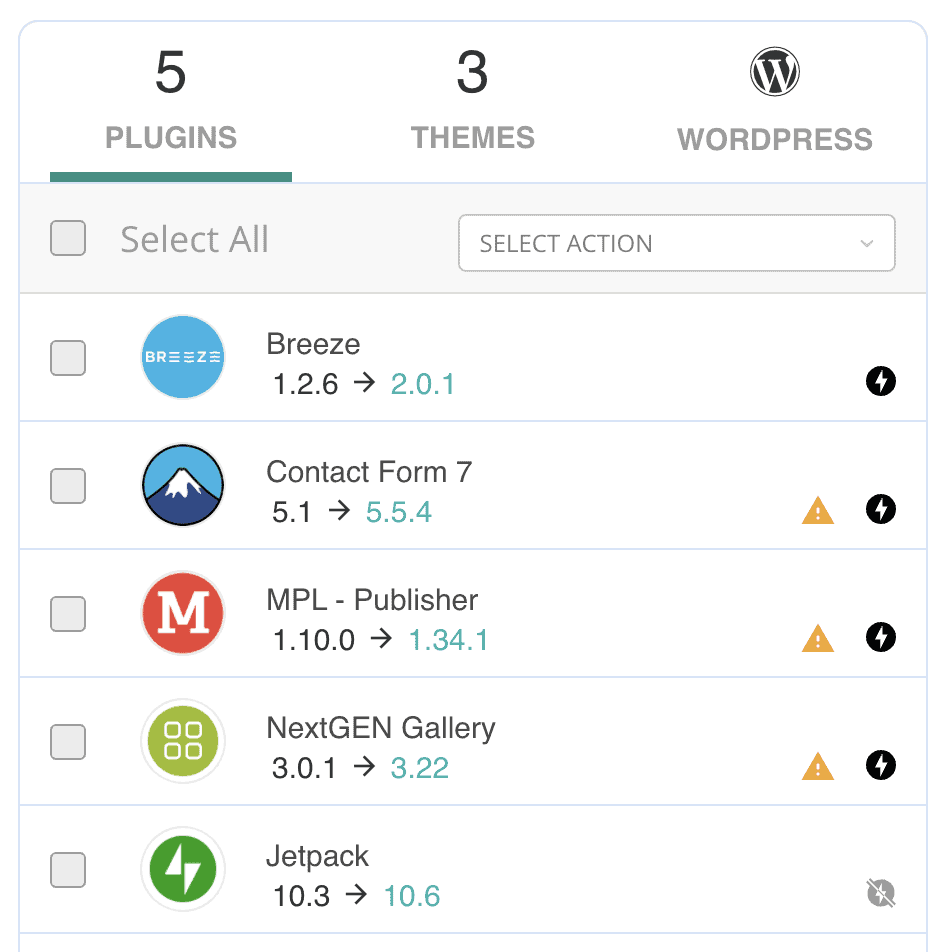
Features
- Automatic, daily scanner
- Scans for the full site: files and database
- Signal-based malware scanner
- Remote scanner
- Vulnerability scanner
Pros
Cons
Pricing
Free malware scanning; location of malware found and removal are premium features.
Verdict
One of the best WordPress malware scanner plugins available, MalCare beats all competition hands down. We especially like that malware removal is also a feature, albeit a premium one. If we find malware on the site, we want to be able to get rid of it as quickly as possible.
2. Wordfence
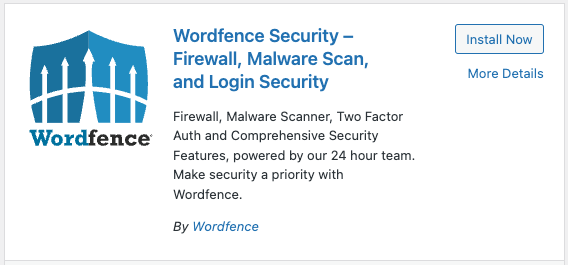
As soon as we installed Wordfence on our test site, it flagged issues. Super, that’s what we wanted it to do. Because we are reviewing just the malware scanning abilities of plugins, we skipped over the firewall and other security features, as we did for MalCare. Straight to the scan section.
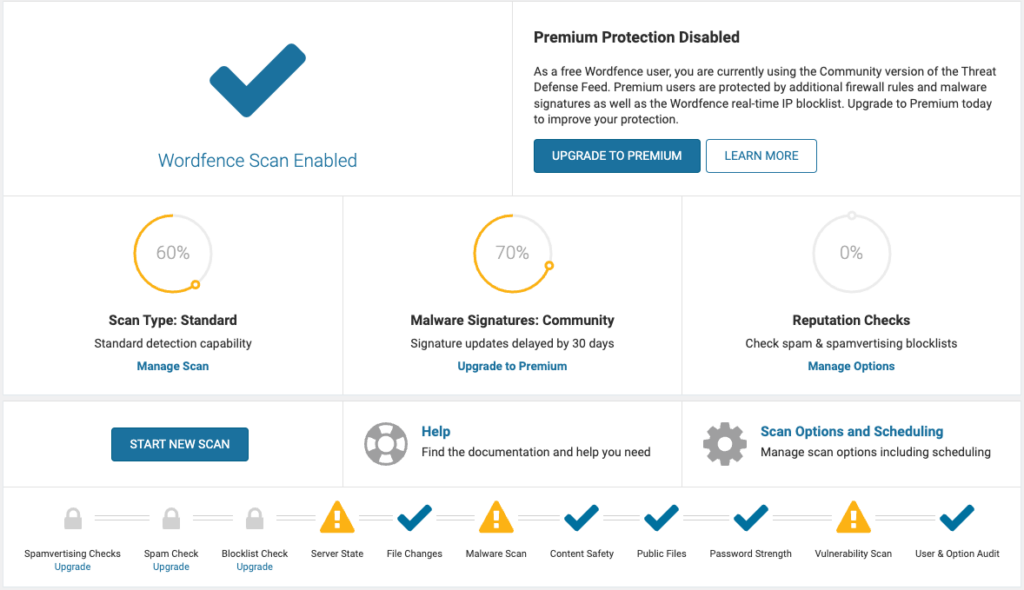
Weirdly enough though, the scan showed us results from another site altogether. We have tested different aspects of Wordfence many times over the years, and sure enough we were seeing old scan results from a different site. Probably something to do with the admin email address that we used being the same, but this was not a good look for the scanner.
Anyhow, we started a new scan and saw a perceptible dip in our site performance. The site was obviously slower to load, and we saw the corresponding resource spike in the server monitoring tools. It is no secret that Wordfence is a resource hog, however much is forgiven for a competent scanner.
Wordfence malware scanner flagged a number of issues, which fell into 3 main categories: malicious or unsafe files; out of date core, plugins, and themes; and modified files. One category was conspicuous by its absence: there was no listing for database malware.

The malicious files were indeed infected with malware, and the modified core files were modified. In some cases, the modification was malware; in others? Not so much. We were surprised to see that license.txt had been marked as modified, because we hadn’t made any changes to that file. Turns out, one character was different. Go figure.

Wordfence did a reasonable job of flagging all the file-based malware in free and open source plugins and themes. It didn’t pick up any of the database malware, and flagged the infected core files as ‘modified’ rather than ‘malicious’, which seems rather less serious.
Based on their documentation, Wordfence has a far more up-to-date signature database for premium users. The free users receive access to those signatures 30 days later. It is understandable that parts of a plugin need to be premium to be viable, however, keep in mind that malware left on a site gets progressively worse as time passes. 30 days in that context? It’s a lot.
To our considerable surprise, Wordfence didn’t alert us to the fact that several plugins and themes had discovered vulnerabilities. It merely flagged that certain ones were out of date, and needed to be updated. While we absolutely subscribe to the philosophy of keeping sites updated always, pointing out vulnerabilities is generally a good accelerant to doing so. Odd that they didn’t mention that.
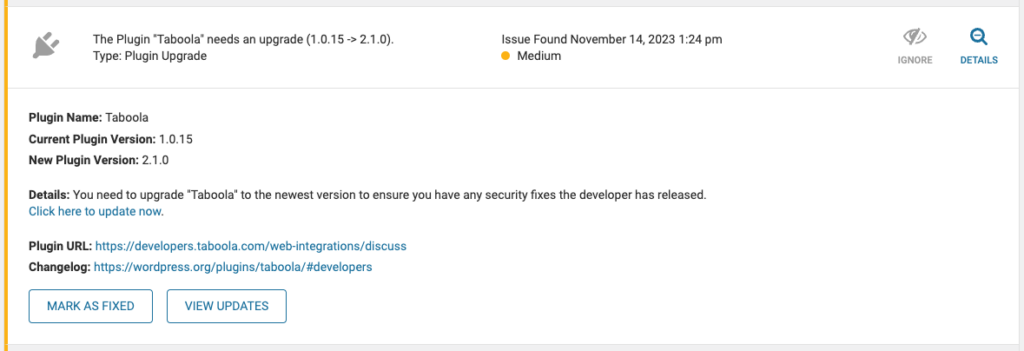
Overall, Wordfence still makes the second spot on this list, simply because the others are far, far worse. It is a decent WordPress malware scanner plugin, but we wouldn’t count it 100%.
Features
- Comprehensive dashboard
- Automatic scans
- Plugin-based scanner
- Customisable scanning options
Pros
Cons
Pricing
Free malware scanning; latest scan signatures are available for premium users only.
Verdict
If MalCare didn’t exist, we would recommend Wordfence. Wordfence spends tons of time and effort on security research, and a lot of that is visible in their plugin. That being said, missed malware is a serious issue. Wordfence uses a signature-matching database to identify malware, and it is a flawed system that will almost always miss new variants of malware. Wordfence combats this with security research, but the results of that research is only immediately available to premium users. Free users have to wait 30 days. However, no shade, because pricing strategies are difficult.
3. Defender Security
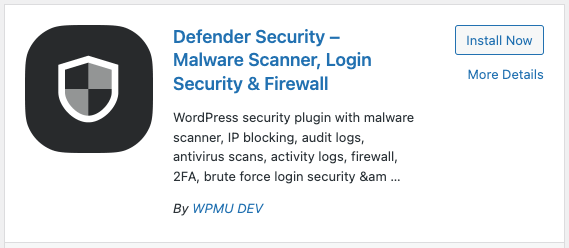
Defender Security by WPMU DEV has a free file integrity monitoring scanner, which will flag changes to files. You can see the list of changed files as soon as you run a scan, and right off the bat we see that a lot of intentional changes, like custom code and files from other security plugins, have been marked as issues. That gives us pause, because very few people (us included) know exactly how plugins are set up and which files they create on a site.
The rest of the scan report is behind a paywall. We are not sure what the results of the scan are, because the results require a paid subscription. This is also true of vulnerabilities on the site.
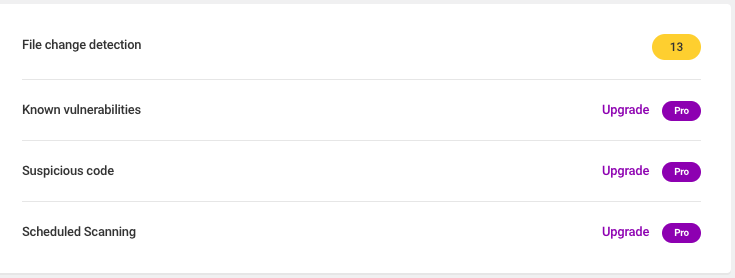
We purchased a plan and ran a new scan to see the results.
Right off the bat, scanning for suspicious code and for vulnerabilities is disabled by default. So is scheduled scanning. We enabled those in the settings, and started yet another scan.
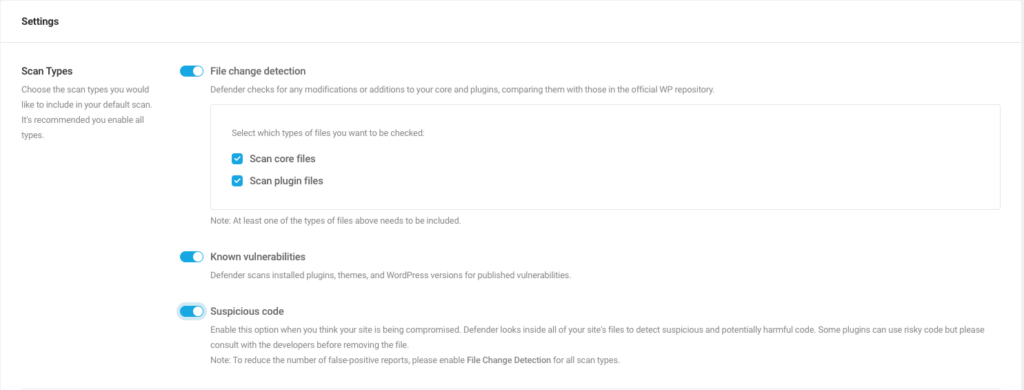
The scan flagged some of the file-based malware, but certainly not all of it. It didn’t flag any of the database malware, nor any in the premium themes and plugins. On the plus side, there weren’t any false positives, and all our vulnerabilities were flagged correctly.
A neat extra we haven’t seen with other scanners is that Defender adds a notice to vulnerable plugins on the Plugins page. It is hard to miss, and is a very useful, contextual reminder to update vulnerabilities quickly.

A final point to note here is that Defender’s support is one the best we have seen.
Features
- Malware scanner
- Vulnerability detection
- File integrity monitoring
Pros
Cons
Pricing
File integrity monitoring is free; malware scanning is a premium feature with plans starting at $36 a year per site.
Verdict
In our considered opinion, any missed malware means a failed scanner. Defender definitely missed about 30% of the malware on our test site, including a particularly nasty redirect infection. And usually, we would have written it off. However, Defender does have good UX for vulnerabilities, albeit as a paid one.
4. Sucuri
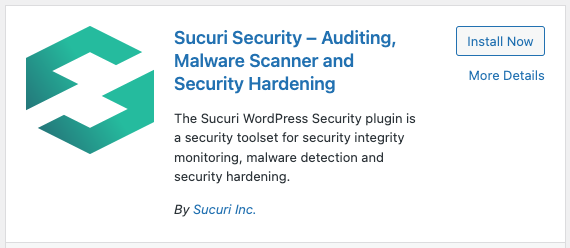
In a word, Sucuri was a disappointment. We expected a lot from the most popular WordPress security plugin, but we got: nothing.
On installing Sucuri, we got a clean chit from the free security plugin. We delved a little deeper into the plugin, only to realise that, even though we had installed the plugin, we were only really getting the online scan—basically what Sitecheck does. Well, that’s too bad.
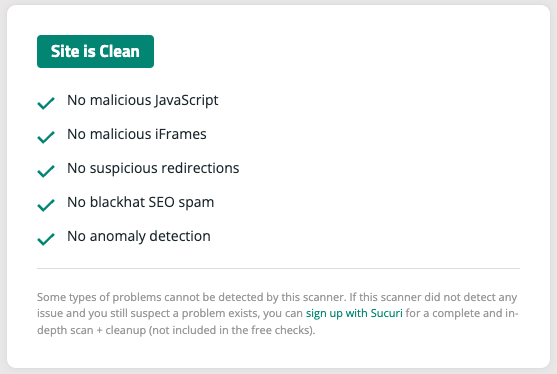
We then upgraded to try the server-side scanner, something that we were led to believe was vastly more effective.
Nope.
Both the scanners told us that our malware-ridden site was free of pestilence—something that was simply untrue. (See MalCare and Wordfence results above.)
The out-of-date plugins and themes are incongruously hidden in the Post-Hack tab. Also, there is no indication as to which updates are important because of, you know, the vulnerabilities those versions have. Oddly enough, the fact that our WordPress version was out-of-date too didn’t show up anywhere. Guess Sucuri isn’t aware that 95%+ hacks are due to vulnerabilities.
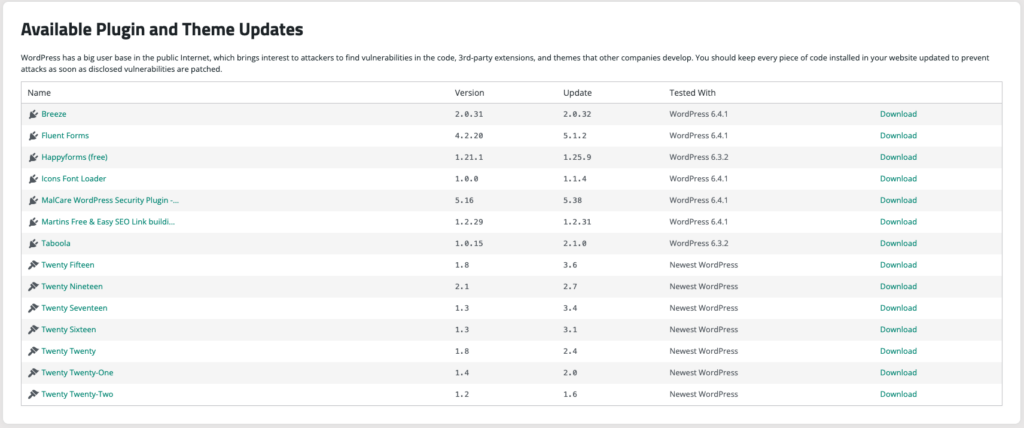
The file integrity monitor did flag some differences in the core WordPress files, and suggested we judge whether it was malware or not. Absolutely not something we would expect a user to know without at least some coding expertise.

And the final coup de grâce was that Sucuri flagged legitimate premium plugin and themes files as suspect, again asking the user to confirm or deny whether this assessment is accurate.
If Sucuri expects users to have such discernment with respect to malware, why exactly would they need Sucuri at all?
Features
- Server-side scanner
- File integrity monitoring
Pros
Cons
Pricing
Free client-side scanner; premium server-side scanner.
Verdict
We struggled to find any positives with Sucuri’s malware scanner. For another article, we did test their malware removal service, which was top-notch. However, we also noted that if we relied on Sucuri’s scanners to tell us that our site had malware, which we should then escalate to removal, we would never know to do so. The only reason Sucuri isn’t further down this list is because their malware removal service and customer support are super. Otherwise, it would be vying for the bottom of the list with some other lemons.
5. NinjaScanner

NinjaScanner is an unassuming-looking plugin, and did much better at detecting malware than we would have suspected at the outset. (Although we have tested their WordPress firewall plugin, and it is one of the better options to MalCare.)
The scan options didn’t give us much hope. For reference, malware can hide in images files too—remember hacked favicon files? It also doesn’t choose to be in small-sized files only. The general rule of thumb with malware is that it can be anywhere on the site.

The scan report was comprehensive to say the least.
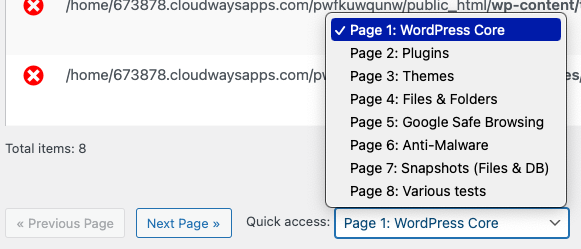
In the anti-malware section of the report, we were encouraged to see that many of the infected files had been flagged. On opening up the files, NinjaScanner highlighted the problematic parts of the malware. The issue here is that the highlighted portions were only fragments of the entire script. Granted, removing them would render the script unusable to a large extent, but the entire script is malicious, so why not get rid of everything?

Additionally, NinjaScanner doesn’t seem to scan the database for malware. It was conspicuously absent in the report, and sure enough the list of malicious code didn’t include our test malware.
Features
- Malware scanner
- Scheduled scans
- File integrity checker
- Blacklist scanner
- Email reports
- WP-CLI scanner
Pros
Cons
Pricing
Free malware scanner for on-demand scanner; to schedule regular automatic scans, upgrade to a plan starting at $19.50 a year.
Verdict
NinjaScanner is a no-frills, no-fuss WordPress malware scanner plugin. It doesn’t catch all the malware on a site, and especially not in the database. However, it does manage to detect most file-based malware successfully, which is better than a lot of so-called scanners on this list. Surprisingly, NinjaScanner doesn’t flag vulnerable plugins and themes. That was a head scratcher for us.
6. Malcure
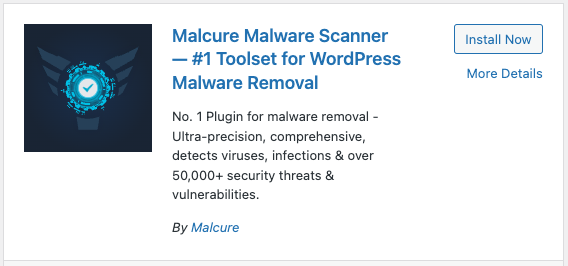
Malcure scans the files of a WordPress site and its database for malware. On installing the plugin, the upgrade notice told us that the malware signatures weren’t the latest ones. To get those, we needed to upgrade. This is similar to Wordfence, gatekeeping the latest security research for premium users.
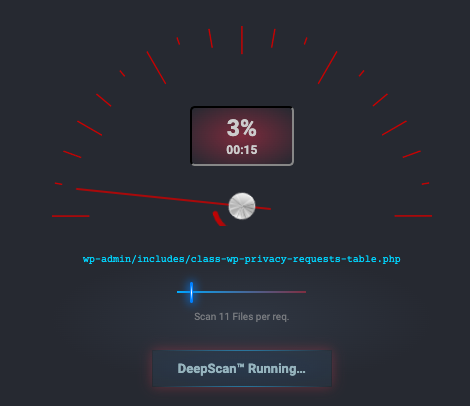
The same concerns apply here: malware becomes progressively worse, the longer it exists on a site. While we can empathise with having a premium product, in our opinion, malware signatures are not the best choice.
Once the Malcure scan completed, we could see problems right in the report. Redirect hack, being the virulent, pervasive disease it is, gets its own spot on the report. Our site had the redirect hack malware, but Malcure didn’t detect it.
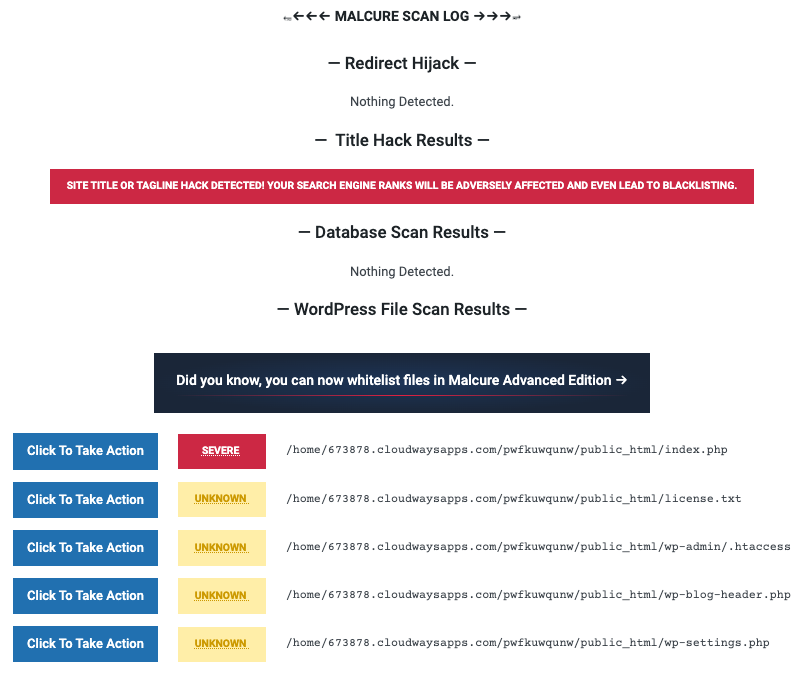
Further down in the same report, we were momentarily pleased to see a spot for database malware. However, again, the scanner plugin couldn’t detect the malware we loaded into the database. More’s the pity.
The infected files marked severe were, indeed, severe. The ones marked unknown, in most cases, were also severely infected.
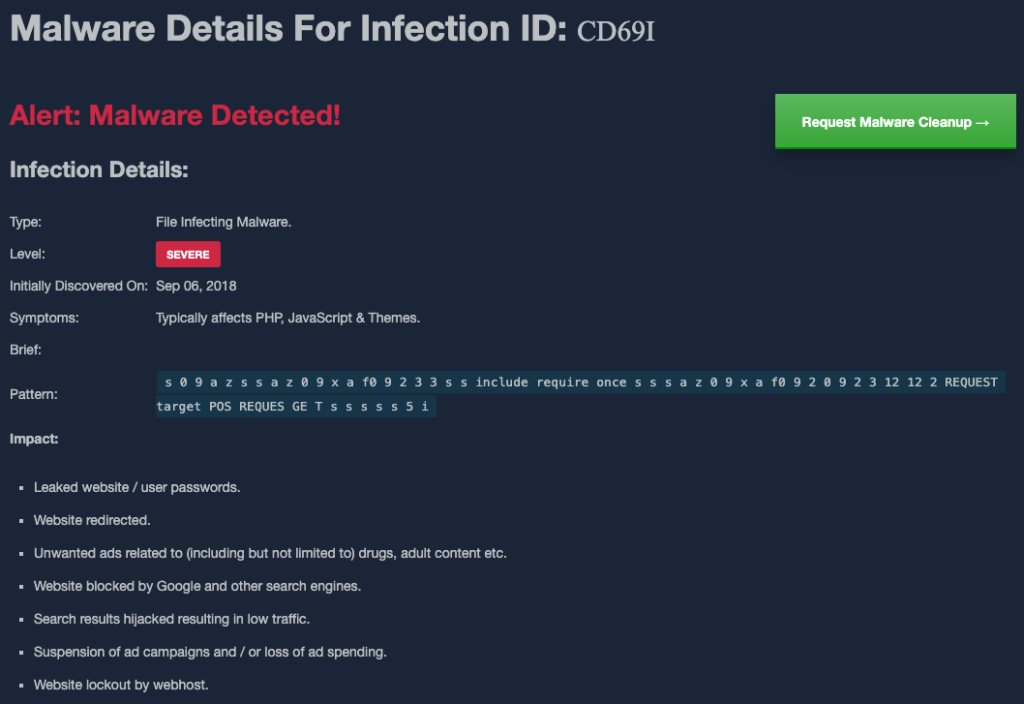

Finally, the list of file-based malware looks, well, a little short. We are giving Malcure the benefit of the doubt and assuming that the full report is available to paid users. Otherwise the takeaway is that the scanner didn’t detect all the malware.
Features
- Malware scanner
- File change monitor
Pros
Cons
Pricing
Free malware scanning; presumably the full scan report is available starting at $149 per site per year.
Verdict
Malcure didn’t work out as a malware scanner for WordPress. Missed malware is a serious issue, and it is just the raison d’être for a scanner. No dice.
7. BulletProof Security

BulletProof Security, like many other malware scanner plugins for WordPress, conflates file matching with malware scanning. This is an easy albeit unforgivable mistake to make.
File matching is only one mechanism to ferret out malware from a site. It cannot possibly be relied on for identifying all malware, because even custom code and premium plugins and themes will then be flagged as malicious.
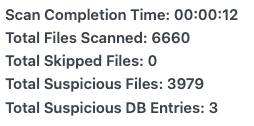
The reason we are underscoring this issue is because the first time we ran a scan using BulletProof Security, it downloaded fresh installs of the core, plugins, and themes from the WordPress repository for comparison with the ones on our site. It creates hashes of these, and stores these references on our site server (therefore hogging resources) and uses them again during subsequent scans.
BulletProof Security is a mixed bag for us: on the one hand, it found database malware that no one plugin could find; but it admittedly flagged a ton of false positives because of pattern matching. On closer inspection of the security report, we found that they advise that false positives are par for the course with the database scanner.

The file scanner report was littered with false positives though, rendering the report unusable. An admin cannot be expected to sift out the malicious from the good code, and it is a site crash waiting to happen.
Features
- Malware scanner
- Scheduled scanner
Pros
Cons
Pricing
Free scanner; all features available for unlimited sites for a one-time fee of $69.
Verdict
All things considered, even though BulletProof Security detected more malware than other plugins, the false positives were a major issue.
8. Security Ninja
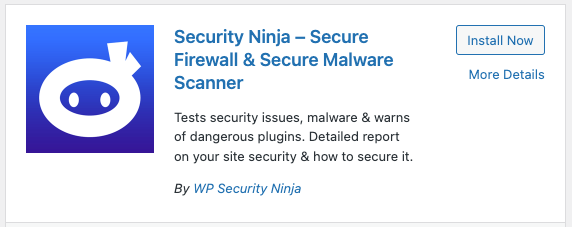
Security Ninja’s security tests, at first glance, look like a bunch of hardening tests. There is a tab for vulnerabilities and one for malware as well, so that was a relief.
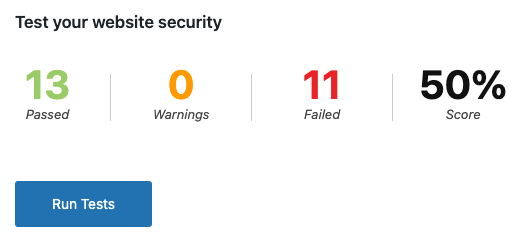
First up, we checked the malware tab. The details are inaccessible for free users, but the list of suspicious files was visible. The results were really mixed. On the plus side, Security Ninja flagged file and database malware. On the minus side, there were both instances of missed malware and false positives.
And then it hit us: the security report was simply an image. It looked like a scan report, but absolutely wasn’t.
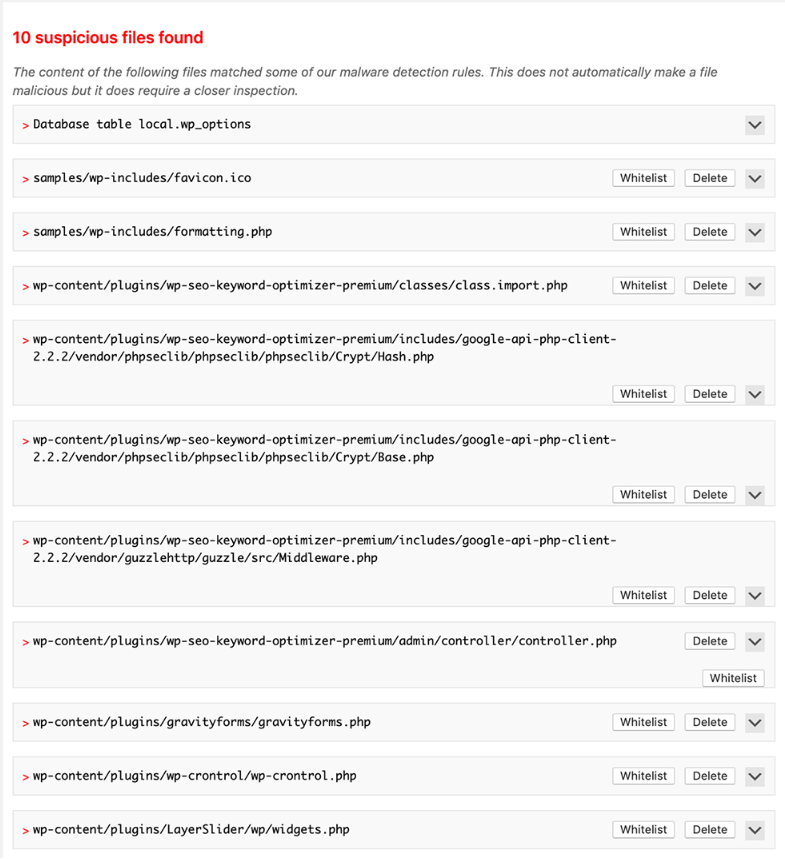
So we headed to the site to get the pro version of the plugin, and installed and activated it. It caused the site to crash.

After a little poking around, we got wp-admin back up again. Finally, we were able to run a scan. The results were mixed, yet again.
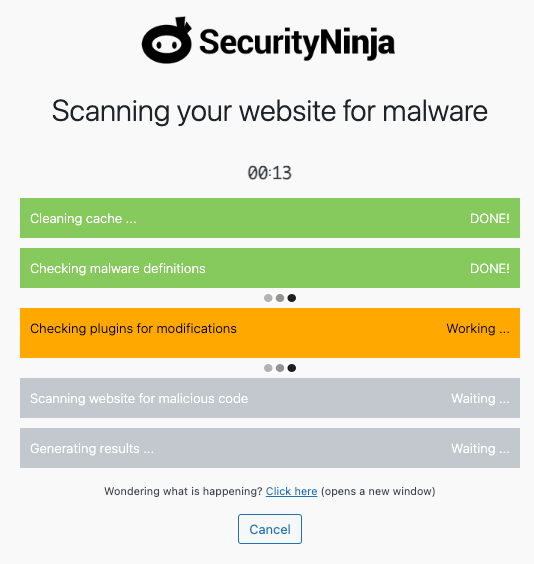
Security Ninja flagged a fraction of the malware located in the files, and none of the database malware at all. To add to the mess, it also flagged legitimate plugin files as malicious.
The vulnerabilities tab further cemented our opinion. While Security Ninja flagged some vulnerabilities in themes and plugins, it certainly didn’t catch them all.
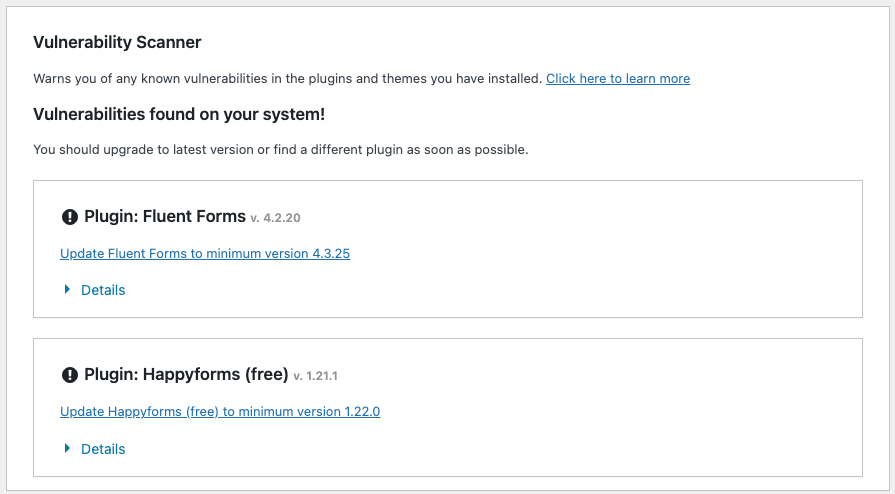
Features
- Malware scanner
- Vulnerability scanner
- Security check
- Scheduled scans
- Email reports
Pros
Cons
Pricing
Scanner is available for $39.99 per site per year.
Verdict
Security Ninja is a definite miss for us.
9. Jetpack
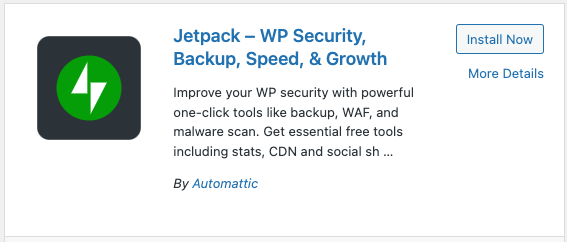
Let’s be honest: we expect good results from Jetpack. So when the scanner fails to identify a single bit of malicious code—whether in the files or database—it doesn’t feel good.
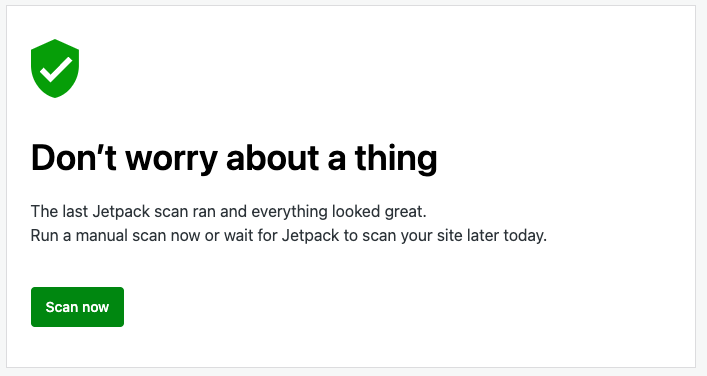
That’s the review for Jetpack malware scanner. What else is left to say?
Features
- Automatic malware scanning
- Threat notifications
Pros
Cons
Pricing
Plans including malware scanners start at $40 a year per site.
Verdict
Jetpack scan missed all the malware on our test site.
10. Security & Malware Scan by CleanTalk
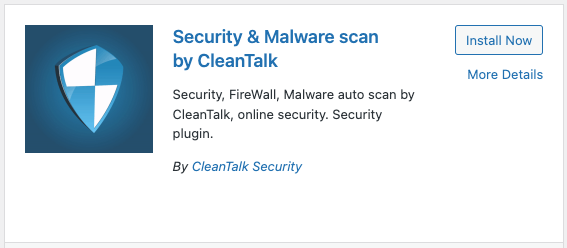
We’re actually fans of CleanTalk’s anti-spam plugin, so we had to add the malware scanner to this list of reviews.
Before we started a scan, we checked the settings first. Good thing too, because there is a tiny option tucked away in the huge list that says: “Cure malware.” We don’t want to test that feature out just yet, so unchecked it really quickly.

The scanner first hashes all the core files, plugins, and themes from the repository. Generally, we don’t care for file matching scanning, because it can lead to a lot of false positives.
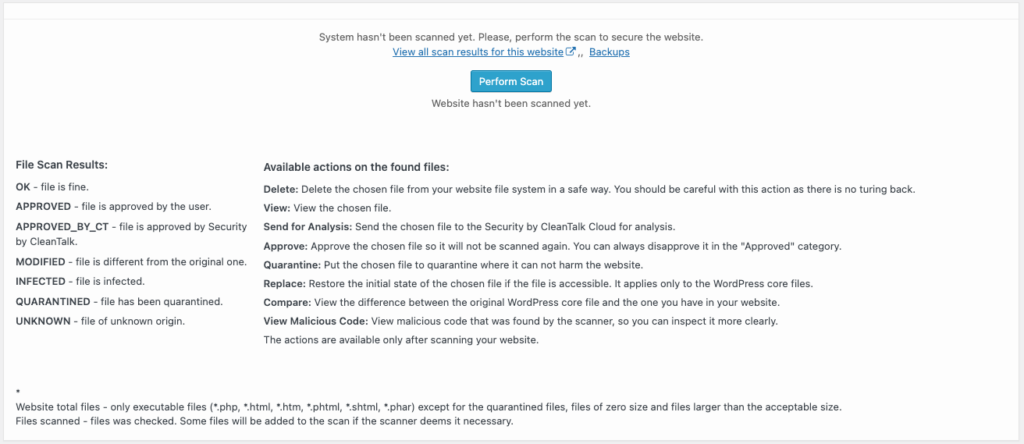
The results were not encouraging. The file-based malware wasn’t flagged as critical, merely suspicious. Only one file was flagged as infected, which it very much was. One of MalCare’s files, which is utterly benign, was also marked as infected. Good thing we unchecked the ‘Cure malware’ option, since it may have deleted legitimate plugin files. No database malware was detected at all.

Features
- Automatic scanning
- Heuristic and signature-based analysis
- File change detection
Pros
Cons
Pricing
Free malware scanner
Verdict
Security & Malware Scan by CleanTalk was a crashing disappointment. Their anti-spam plugin is aggressive but effective. The malware scanner? Not so much.
11. miniOrange Malware Scanner
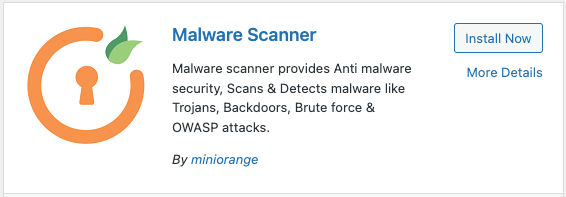
miniOrange has a bunch of WordPress security plugins, so we specifically picked the malware scanner to test.
The interface is fairly basic, and we were pleased to note that the malware scanner was enabled by default. We chose the standard scan option from the settings pane, and everything went downhill from there.
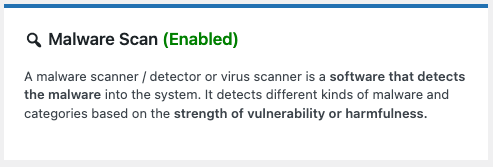
First of all, security and site performance absolutely cannot be traded off against each other. If performance degrades, visitors will stop visiting the site. If security is sidelined, visitors will be in danger when visiting the site. These two things are non-negotiable. So miniOrange’s message to run scans when the site is not in use? Not great.

The standard scan checks the core, plugin, and theme files for malware. You will notice there is no mention of database malware at all. With these misgivings, we started a scan and waited.

The scan took a fair amount of time to finish, and we were enthused to see that there were 27 issues flagged. The report however dashed our hopes, because it clearly said there were no critical issues on our site. A site chock full of malware? Sure.
Features
- Malware scanner
- File change detector
Pros
Cons
Pricing
Free scanner, with the option to upgrade to find out details about detected malware.
Verdict
As with Sucuri, miniOrange cannot clean out malware it hasn’t been able to detect. At least some of the other malware scanner plugins on this list detected some malware, but miniOrange failed completely.
12. SecuPress
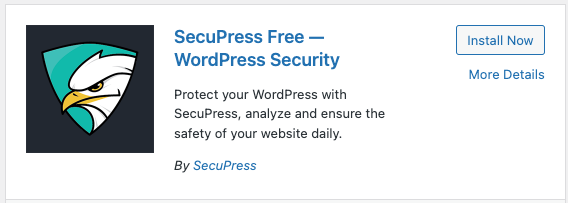
We’re really big fans of rapid scans of a site, but a too-fast scan sends up warning signals. SecuPress launched a scan and it finished in literal seconds. That’s impossible. While MalCare has rapid malware scans, it is because the site is first synced to offsite servers, and scanned there.
Our misgivings were realised when we saw the SecuPress scan results. Under the malware scanning part of the report, we found checks for file enumeration, file permissions, and disabling executable files in the uploads folder. None of these things belong under a malware scanning heading.
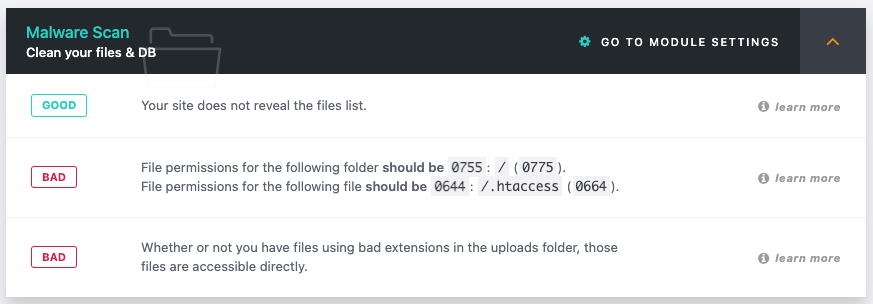
Perhaps we were quick to jump the gun, so we checked settings for that particular module, and realised that malware scanning is a premium feature. Well then, say so! The entire interface looks like it is scanning the site for malware, rather than just testing security configuration.
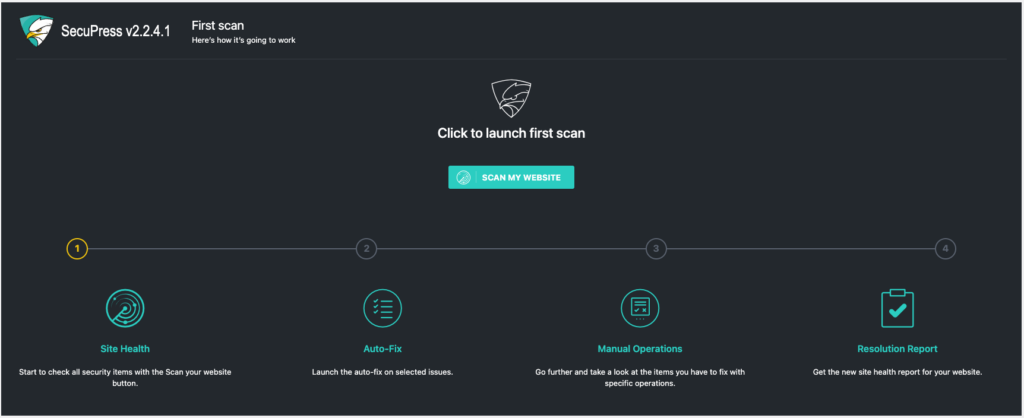
Anyway, we then tried to upgrade the plan to test the scanner, but were locked out because of geoblocking. How do we know? Because SecuPress let us know. (As an aside, this doesn’t engender confidence in their firewall.)
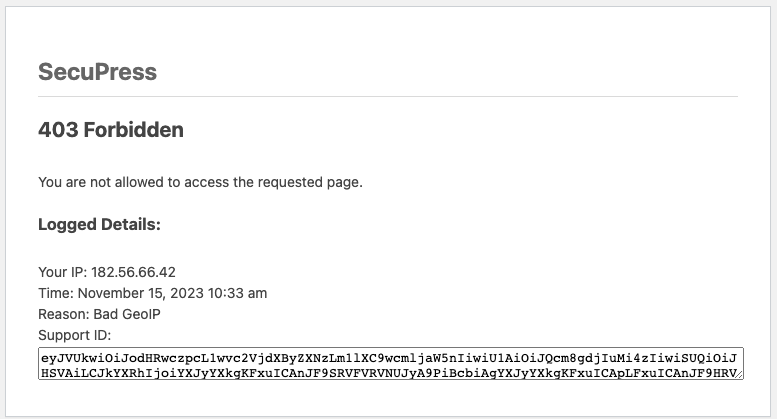
Features
- Malware scanning
- Configuration scan
Pros
Cons
Pricing
No idea, as the pricing page was blocked for us.
Verdict
The free WordPress malware scanner looks like it scans for malware, but it doesn’t really. We weren’t able to adequately test the paid version, because our IPs were blocked by SecuPress. We could have used a VPN to bypass this block, but why on earth should we?
13. Quttera
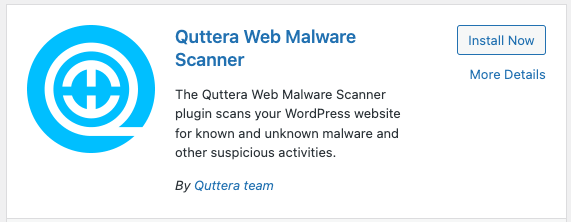
Quttera very confusingly has three scanner tabs when you first install the plugin: external scanner, internal scanner, and internal scanner (high sensitivity). The external scanner is a client-side scanner, and the internal ones are server-side. Why these two types are separated from within wp-admin, we cannot begin to guess but here we are.
We are interested in the results of the internal malware scanner, but we already have lowered our expectations after reading the following advisory: “The internal scan will check PHP/JS/CSS and image files for malware.” That’s not good enough; what about the other file types, like video files, that can potentially have malware?
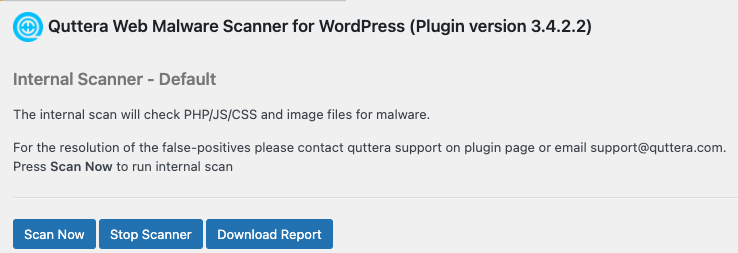
High sensitivity scanning means that Quttera uses heuristics to detect malware on a site, but equally is in danger of false positives.
We would tell you about the results of the scan, but as of writing this review—a full 45 minutes later—it has still not completed.
Features
- Malware scanner
Pros
Cons
Pricing
Scanner is free.
Verdict
We would have been hard-pressed to find a WordPress malware scanner plugin worse than SecuPress, which literally blocked us out but Quttera surprised us. In our list of necessary features for a scanner, we will be adding scans that actually complete.
Key considerations when choosing the best WordPress malware scanner plugin
When choosing the best WordPress malware scanner plugin, there are several factors you need to consider.
A plugin that scans for malware
First and foremost, you need to ensure that the plugin in question indeed scans for malware.
This might sound like a no-brainer, but it’s surprisingly not a given. Many scanners on the market perform other tasks, scanning for vulnerabilities instead of malware, or looking for your site on various blacklists. Some even offer file change detection or file matching analysis. While these features can certainly be useful, they’re not what you’re looking for when you need to find malware on your site.
You’re looking for a plugin that can detect and alert you about any malicious code on your website. A malware scanner should do one job, and it should do it very well – identify malware.
Full scans vs. partial scans
Consider the extent of the site scan it performs—specifically the difference between complete or full scans, and partial scans. You may encounter plugins that offer online scanning services. While these may seem convenient, the truth is that online scanners are limited because they can’t access or scan files on the server.
Plugin scanners are not always full scanners either. Many will focus on just the site files, rather than considering the site database at all. Others will only scan plugin and theme files, and forget about core files. The bottom line is that every part of the site needs to be scanned for malware, because it could literally be anywhere.
No missed malware
Your scanner should be thorough, leaving no malware undetected, including backdoors and any other hidden threats. Leaving even a single piece of malware on the site can have enormous implications. A single, overlooked backdoor can transform your website from secure to compromised in an instant.
A WordPress malware scanner plugin should ensure no malware, no matter how hidden or sophisticated, can slip through the net. Simply put, when it comes to malware, you need zero tolerance.
Signals vs signatures
Signature matching scans for known malware signatures. However, it often misses new or unknown malware forms. On the other hand, signal matching is more dynamic.
Signal matching operates by detecting over 100 signals of malicious behaviour in the code. This system is incredibly effective at identifying new or emerging threats, offering superior protection. Plus, it reduces the likelihood of false positives, thereby offering you a more accurate view of your website’s security status.
Doesn’t rely on file matching for scanning
The malware scanner plugin must work well beyond just the standard WordPress repository code. Essentially, your scanner should be capable of finding malware in premium themes and plugins that aren’t sourced from the repository. After all, not all threats come from free sources. Therefore, having a scanner that goes beyond simple file matching with hashes is a must.
Remote vs. site-level scanners
Remote scanners offer a distinct advantage over their local counterparts in terms of performance. Local scanning requires the use of your server resources which can slow down your website considerably. Remote scanning, on the other hand, does all the heavy lifting offsite, causing no performance penalty to your website.
Regular scans
Regular scans ensure that your site is frequently monitored and any potential threats or vulnerabilities are swiftly identified. In fact, we strongly advocate automatic, scheduled scans. They provide continuous monitoring without you having to constantly set them up.
Do I need a malware scanner plugin for WordPress?
Let’s cut to the chase: unequivocally, yes.
The fact is that no security system or firewall is 100%. While good firewalls, like MalCare, will block out attacks, there is always the risk of a password or data breach that exposes admin passwords. A hacker could get a hold of this and wreak havoc on a site.
At this time, the only thing standing between your website and absolute chaos might just be a reliable scanner that constantly checks your site. It’ll not only detect the intrusion within 24 hours but also alert you to take immediate action.
Secondly, when there is malware on your site, you want to know about it before anyone else does. And only a scanner can give you that peace of mind. Think of the stakeholders of your site:
- Visitors: Nothing scares off visitors faster than encountering spam or being redirected to a suspicious site. This damaging experience can result in lost trust as well as revenue.
- Web hosts: Web hosts are wary of malware for good reason. It can compromise their servers, prompting them to suspend or even delete your site without a second thought.
- Google: Google highlights unsafe websites with their Safe Browsing screens, flashing a warning in siren-red to steer visitors away. It’s certainly not something you’d want to hamper your site’s reputation.
In short, it’s not a question of “if” you need a WordPress malware scanner plugin, but “which” scanner will serve your needs best.
What to do if the scanner detects malware on your site
If your WordPress malware scanner spots any malicious software on your site, act swiftly. Begin the cleanup process immediately to minimise damage. Don’t know where to start? Refer to our comprehensive malware removal guide for a step-by-step approach to securing your website again. Always remember, time is of the essence when dealing with malware.
Conclusion
In short, keeping your WordPress site safe from constant malware attacks isn’t easy. It gets trickier if your scanner can’t find all the malware on hacked sites.
Having thoroughly tested numerous options, it is clear that MalCare stands out as the best WordPress malware scanner. It offers a reliable report confirming whether your site has been hacked.
FAQs
How do I check for malware on WordPress?
To check for malware on WordPress, use a malware scanner plugin like MalCare that scans your site and reports any potential threats. Alternatively, you can manually inspect your site files and database for unusual or suspicious code.
How do I run a malware scan on my website?
To run a malware scan on your website, you simply need to install a malware scanner plugin, like MalCare. Once installed, follow the instructions provided to sync your site. The scan will initiate automatically, and will check your site for potential threats.
How do I protect my WordPress site from malware?
Protect your WordPress site from malware by employing strong security practices. This includes keeping your plugins, themes, and WordPress version updated, using strong, unique passwords, and installing a reliable security plugin like MalCare that provides regular scanning and instant alerts for potential threats.
Which is the best free malware scanner plugin?
MalCare is the best free malware scanner plugins for WordPress, providing reliable reports on your site’s security status. However, to access its malware removal features, an upgrade to a paid subscription is required.
Which is the best malware scanning service?
MalCare ranks as a top choice for exceptional malware scanning services. It offers comprehensive scanning, timely detection, and prompt removal services.
There was malware on my site, but the scan is showing clean. What to do now?
If a scan is showing your site as clean despite a known malware issue, consider running a scan with a different plugin or service like MalCare. A lot of scanner plugins do not or cannot scan the entire site, especially missing scripts and other malware in the database. This is one of the many reasons MalCare is the best malware scanner plugin for WordPress.
Thinking about installing multiple malware scanners, what’s your thoughts/experience?
While multiple malware scanners may seem like a better defence, it can cause confusion, performance issues, and increased false positives. It’s generally more effective to choose one robust, reliable scanner like MalCare, and use strong preventive measures like regular updates, strong passwords, and secure hosting.
Malware is affecting our shared server which has about 20 WordPress websites.
Malware affecting a shared server can be complex to handle. You should notify your hosting provider immediately as they may help isolate the issue. On each WordPress website, install a trusted malware scanner like MalCare, run a full scan, and follow the instructions to clean up the malware. After that, enhance security measures to prevent re-infections.
Error or problem scanning malware on my WordPress website.
If you’re having trouble scanning for malware on your WordPress site, ensure your security plugin or service is properly installed and updated. If the issue persists, contact their customer service for help. Alternatively, you may need to try another plugin altogether. We strongly recommend MalCare for its great malware detection abilities and easy installation.
How to scan the WordPress database for malware?
To scan the WordPress database for malware, a reliable plugin like MalCare is highly recommended. These plugins not only thoroughly check your site’s files, but also scan your database for any malicious code or unusual activity. Install the plugin, run a scan, and it should handle this process for you seamlessly.
I need to know the right way to scan infected website files.
To scan infected website files, you should use a reputable security plugin like MalCare. Once the plugin is installed, you can initiate a scan which will browse through your website’s files and identify any infected or suspicious files. For thoroughness, consider that MalCare also checks the database, as malware can often reside there too.
Share it:
You may also like
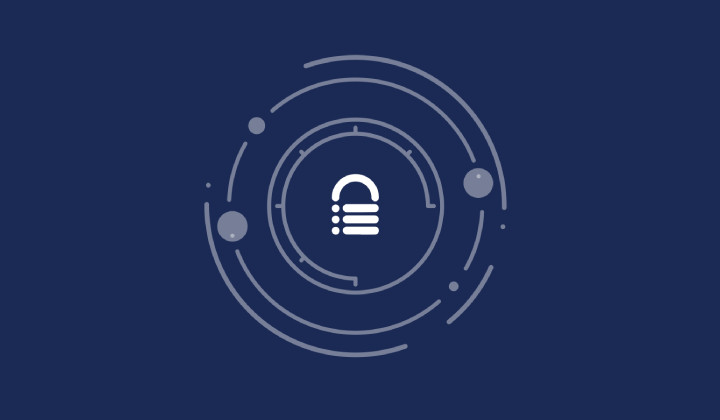
MalCare Ensures Unmatched Protection Against User Registration Privilege Escalation Vulnerability
Imagine discovering that your WordPress site, which should be secure and under strict control, has suddenly become accessible to unauthorized users who have the same administrative powers as you. This…

MalCare Ensures Proactive Protection Against WP-Members XSS Vulnerability
MalCare continues to protect its customer sites from all kinds of attacks, even the ones exploiting zero-day vulnerabilities. The recent stored cross-site scripting (XSS) vulnerability found in the WP-Members Membership…
![Top 9 ManageWP Alternatives To Manage Multiple Sites Easily [Reviewed]](https://www.malcare.com/wp-content/uploads/2022/12/malcare-default-image.jpeg)
Top 9 ManageWP Alternatives To Manage Multiple Sites Easily [Reviewed]
ManageWP is a popular name in the WordPress maintenance plugins market. People love how much you get for a free plan, how easy it is to set up, and how…
How can we help you?
If you’re worried that your website has been hacked, MalCare can help you quickly fix the issue and secure your site to prevent future hacks.

My site is hacked – Help me clean it
Clean your site with MalCare’s AntiVirus solution within minutes. It will remove all malware from your complete site. Guaranteed.

Secure my WordPress Site from hackers
MalCare’s 7-Layer Security Offers Complete Protection for Your Website. 300,000+ Websites Trust MalCare for Total Defence from Attacks.








